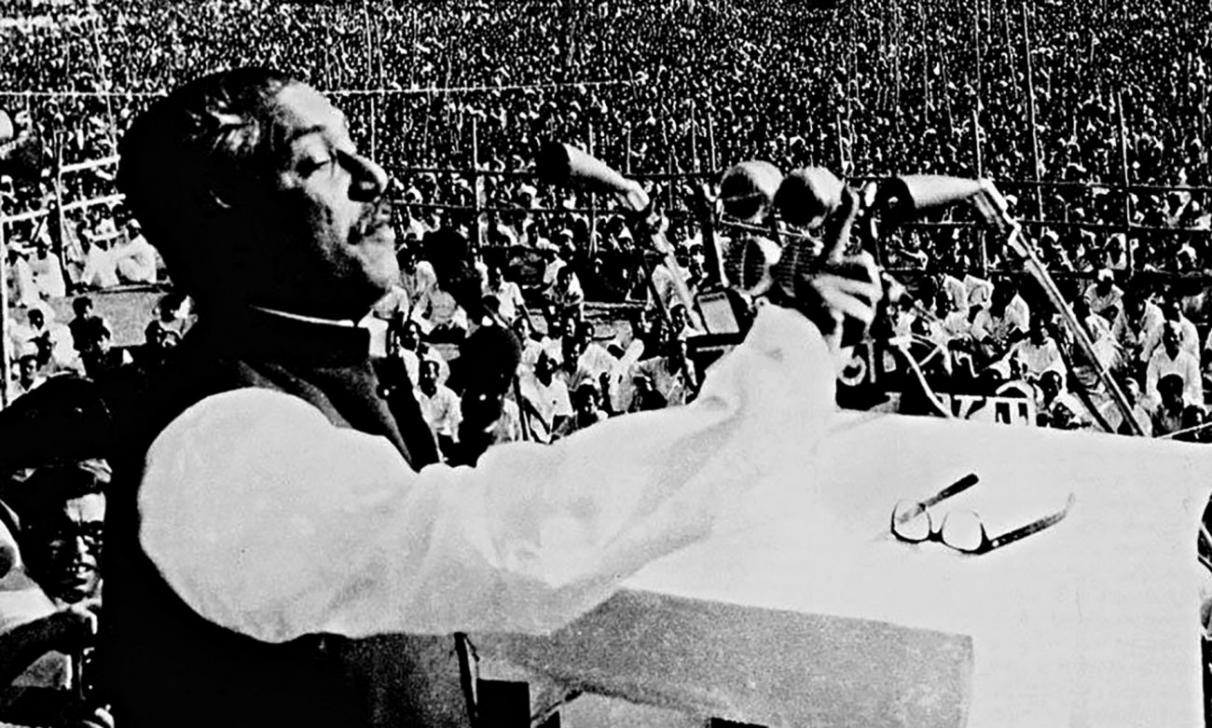Bangabandhu’s 7th March speech, considered to be his unofficial proclamation of independence, came as a response to President Yahya Khan’s announcement on March 6 of a new date of the national assembly.
Awami League supremo Sheikh Mujibur Rahman made his most inspiring speech on March 7, 1971, demanding an unconditional transfer of power and urging people to launch an all-out movement against the oppressive West Pakistan rulers, making his stance clear to the world—he wanted independence.
Bangabandhu’s speech, considered to be his unofficial proclamation of independence, came as a response to then president Yahya Khan’s announcement on March 6 of a new date for the national assembly.
Around half a million people attended the rally.
Yahya’s U-turn was meant to tame down the Bangalis who had been aroused by his previous suspension order given a week ago and the army killings amid a countrywide curfew.
But Yahya had his evil plan: he appointed Punjabi General Tikka Khan as the governor of East Pakistan and started reinforcing the military in the province.
The first major evacuation of foreigners from East Pakistan had already begun because of the fresh reinforcement and following press reports that clashes between security forces and demonstrators in Khulna resulted in 18 deaths and 86 wounded, according to a CIA intelligence memorandum prepared on March 7, 1971.
Although Dhaka was quiet and the dawn-to-dusk curfew had been lifted, curfews remained in other East Pakistani cities.
Meanwhile, the US embassy in Islamabad felt that the recent events—Mujib’s and Yahya’s speeches—had “averted an immediate shutdown, but that the next few days will tell whether the military decides it has had enough—which could mean a crackdown and the arrest of Mujib and others—or whether it still believes there is a chance to negotiate.”
The officials observed that the events of March 6-7 had not altered the basic elements.
“Bengalis appear bent on a degree of autonomy that the Pakistani military (and probably Bhutto) are unable to swallow. The question now is whether Yahya or Mujib will blink first—or whether neither will blink. The showdown cannot be put off much longer,” another declassified document prepared on March 8 reads.
“The embassy feels that Mujib’s goal—emancipation of East Pakistan—remains unchanged, but that Mujib may no longer believe this can be obtained through his program of provincial autonomy.”
The officials predicted that Mujib might plan to achieve independence and “try to take over power gradually to avoid a direct confrontation with the military.”
Yahya tried to suppress speech
Mujib did not announce the secession of East Pakistan in his much-heralded speech before a large rally at the then Race Course Maidan (now Suhrawardy Udyan); instead, he demanded an end to martial law and the transfer of power to popularly elected representatives in East Pakistan—as a precondition—to consider attending the national assembly scheduled for March 25.
“He also demanded the return of troops to their barracks and inquiries in the East Wing during the recent period of violence,” reads the CIA memo dated March 7, 1971.
“East Pakistani leader Mujibur Rahman’s speech indicates his tone was tougher than previously reported,” it adds. Mujib also criticized Yahya Khan and Zulfikar Ali Bhutto, leader of the largest party in West Pakistan—Pakistan People’s Party.
Meanwhile, the authorities of erstwhile East Pakistan initially tried to prevent widespread public knowledge of parts of his speech, the memo says. “But the martial law authorities later relented and permitted a recorded version to be broadcast.”
Warning for the military
In addition to announcing a 10-point non-cooperation program, Mujib made scathing attacks on West Pakistanis, particularly the army and the “Punjabi ruling coterie.”
Punjabis are the largest group in West Pakistan and have been accused of exploiting not only the Bangalis of East Pakistan but also non-Punjabi West Pakistanis, the CIA document says.

The CIA identified Lt Gen Tikka Khan, the new governor of East Pakistan, as a “highly respected” West Pakistani who was considered a “tough but fair officer with a pragmatic approach to problems.”
Tikka Khan outranked the martial law administrator for the East Wing, Lt Gen Yaqub Khan. Prominent West Pakistani political leaders welcomed Yahya’s call for the meeting of the national assembly on March 25.
On the other hand, Bhutto “reversed his previous position” and announced his willingness to attend the session. “His earlier refusal to attend the session originally scheduled for March 3 helped trigger the crisis of the past week,” the CIA had observed.


Leave a Reply
You must be logged in to post a comment.